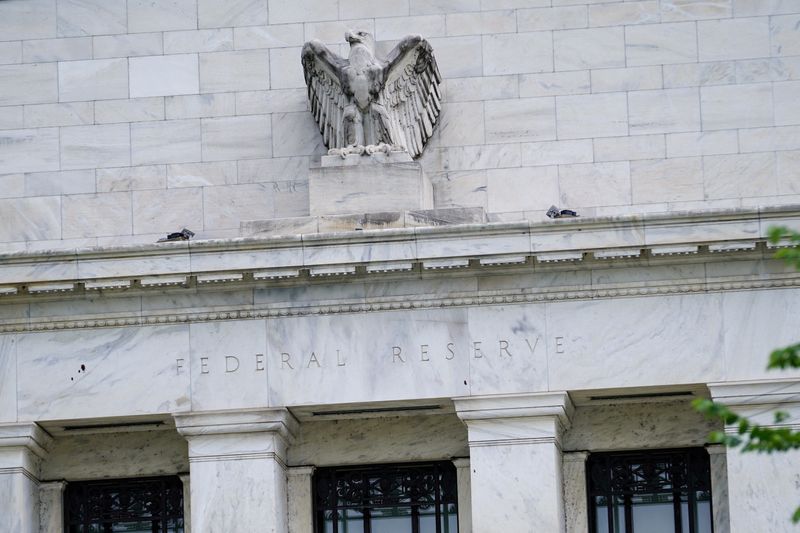Diverging stock and bond views on Fed turn into chasm: McGeever
By Jamie McGeever
ORLANDO, Florida (Reuters) -Bond investors are by default pessimists and equity investors are naturally optimistic. But this market maxim doesn't fully explain the seemingly wide chasm developing between the two camps' views on the U.S. economy and looming interest rate cuts.
Rates markets are currently pricing in an aggressive Fed easing cycle historically consistent with profound market shocks, recession, or both. Wall Street, meanwhile, continues to keep equity prices near all-time highs and is trading on expectations that earnings growth will exceed 15% next year.
Something doesn't add up.
HALF EMPTY?
The bond market is often said to be a more reliable economic and monetary policy weather vane than the stock market, but the former has been getting it wrong for years. It has consistently underestimated the resilience of the U.S. economy and has repeatedly been premature in calling the starting gun of the Fed's easing cycle.
Rates futures are pricing in almost 100 basis points of cuts over the Fed's three remaining scheduled policy meetings this year, 150 bps by March, and 200 bps by September next year. The negative spread between the fed funds rate and two-year Treasury yield is at historic levels.
This amount of implied easing is consistent with the early 1990s recession, the dotcom crash, the Global Financial Crisis and Covid-19, according to Bob Elliott, CEO at Unlimited Funds and a former executive at hedge fund giant Bridgewater.
"Current pricing of cuts this quickly is in line with the depths of past recessions or crises, not stocks basically at all-time highs," Elliott says.
And even though U.S. rates futures markets have calmed down considerably since the Aug. 5 volatility shock, they are still attaching a one-in-four chance to the Fed cutting rates by 50 bps at its September meeting.
The only times in the modern era the Fed has started an easing cycle with a half-point cut were in January 2001, September 2007 and October 2008. Two of those were emergency moves, the other followed two Fed conference calls to discuss the emerging signs of severe market stress at the time.
OR HALF FULL?
Meanwhile, stocks are certainly not priced for recession.
After the recent correction fueled by the unwinding of several crowded trades, a selloff in Big Tech mega caps, and a violent volatility shock, stocks have staged a remarkable recovery. The S&P 500 is now within 1 percent of July's record peak.
Shares in Nvidia (NASDAQ:NVDA ), the fairy dust-sprinkled symbol of the AI future, for instance have rebounded 43% in only two weeks.
It's not just Big Tech that equity investors are warming to. The second-quarter earnings season nearing completion shows profits for S&P 500 companies grew by 13.4% year-over-year, up 5.1 percentage points from estimates at the beginning of the season. Nine of 11 sectors posted increased profits.
And the consensus estimate for aggregate S&P 500 earnings growth for next year is even higher at 15.2%, according to LSEG/Refinitiv data, with every sector expected to post earnings growth. Part of the market's optimism is no doubt predicated on expectations of a lower discount rate, but the outlook for the consumer, and for corporate profits, just isn't that bleak.
STOCK MARKET HAS IT RIGHT?
So what is the bond market seeing that the stock market isn't?
One could argue that this divergence is a mirage that can be explained away by looking at the real – or inflation-adjusted – federal funds rate and changes to the so-called R-star, the Fed's estimate of the long-run neutral rate of interest that neither spurs nor saps economic activity.
As inflation has cooled over the last year, the policy target range has held steady at 5.25-5.50%, lifting the real fed funds to nearly 3%, the highest since 2007.
The Fed's estimate of R-star is 2.8%, meaning the policy rate could be cut by 250 basis points and still be considered "restrictive". So maybe significant rate cuts need not be associated with recession or crisis?
But if one looks at the still-modest unemployment rate, reasonably healthy economic growth, and narrow credit spreads for investment- and junk-rated firms, it's tough to argue that policy is that tight at all.
So maybe this is another example of why the rules of the past simply don't apply when trying to judge today's economy. Regardless, the equity market does seem to be on firmer ground.
"You look at earnings, and it doesn't look like we are in a recession," says Callie Cox, chief market strategist at Ritholtz Wealth Management. "I would believe the equity market in this scenario. The equity market has this right - the economy is still in a good position."
It's usually the bond market that's right. But maybe this time it really is different.
(The opinions expressed here are those of the author, a columnist for Reuters.)
Source: Investing.com
